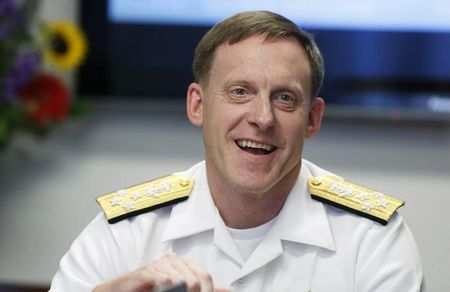By Doina Chiacu
WASHINGTON (Reuters) - As U.S. military leaders outlined their strategy before Congress to fight Islamic State militants on the battlefield, the National Security Agency chief said on Tuesday he was watching the media-savvy group's cyber capabilities.
Asked whether the Sunni Muslim group was planning cyber attacks on U.S. interests, Admiral Mike Rogers said he could not discuss specifics of the organisation's technical capabilities.
"We need to assume that there will be a cyber dimension increasingly in almost any scenario that we're dealing with," Rogers said at a cybersecurity conference in Washington.
"Counterterrorism is no different. Clearly, ISIL has been very aggressive in the use of media, in the use of technology, in the use of the Internet. It's something I'm watching," he said, using an acronym for the group.
Islamic State, which controls large swaths of Iraq and Syria, has posted carefully choreographed beheading videos online, trumpeted its violent acts on Twitter and used social media to recruit foreign Islamists to the fight.
"Its public messaging and social media is as slick and as effective as any I've ever seen from a terrorist organisation," Homeland Security Secretary Jeh Johnson told the Council on Foreign Relations in New York last week.
The group's capabilities beyond using YouTube and Facebook are less clear.
Cybersecurity expert James Lewis of the Centre for Strategic and International Studies said he did not think Islamic State posed any immediate cyber threat to American interests.
"They'd need a connection to the Syrians, Iranians or the Russians, and that's unlikely to happen," Lewis said. "They're also nuts and cyber doesn't scratch the itch."
While there may be no imminent or specific cyber threat from Islamic State, there is a wide-ranging intent to damage the West, a congressional aide said. Different jihadist groups have talked about launching cyber attacks and it may be just a matter of time before they find someone capable of doing it, the aide said on condition of anonymity.
Rogers, speaking generally on how cybersecurity threats are proliferating across all aspects of American life, said: "There is nothing but increased activity out there."
As Pentagon officials told Congress on Tuesday they were preparing for a longer-term campaign against Islamic State in Syria and Iraq, Rogers said cyber defence was a long-haul effort.
The U.S. Cyber Command he leads hopes to have 6,200 cyber employees by 2016 to detect and deflect such threats, and Rogers urged greater cooperation on cybersecurity between government, business and industry.
"There are a lot of groups out there - individuals, nation-states - who feel that this is an area worth investing in, because it achieves positive outcomes for them if they can penetrate systems," Rogers said at the Billington Cybersecurity Summit.

"This is not a small problem and it's not one that's going to go away."
(Reporting by Doina Chiacu; Editing by Mohammad Zargham and Diane Craft)
_800x533_L_1412662134.jpg)